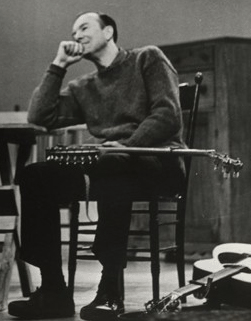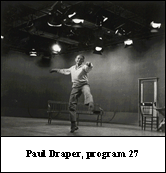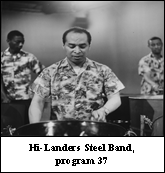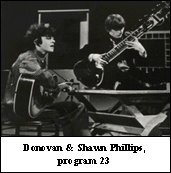1. Tom Paxton, The Clancy Brothers & Tommy Makem
The Clancy Brothers and Tommy Makem from Ireland sing traditional and contemporary Irish songs, including Butcher’s Boy. Seeger joins Tom Paxton, a singer/songwriter, on his song Ramblin’ Boy.
2. "Leadbelly"
In this solo performance, Seeger sings some of the songs composed by the famous black folksinger Huddie Ledbetter, better known as Leadbelly. He also performs his well-known allegorical story about the power of music, Abiyoyo. Includes rare films of Leadbelly.
3. Elizabeth Cotten, Rosa Valentin & Rafael Martinez
Seeger and Elizabeth Cotten sing her famous song, Freight Train and she demonstrates her left-handed guitar playing. Valentin and Martinez sing songs from their native Puerto Rico, including Los Pobres de la Tierra (The Poor of the Earth).
4. Ruth Rubin
Ruth Rubin is America's foremost collector of Yiddish folk music and the translator of countless Yiddish songs. Here she performs several well-known Yiddish songs including Chanuke O Chanuke and Tumbalalayka.
5. Jean Ritchie & Bernice Reagon
Jean Ritchie, long-time collector of Cumberland Mountain songs, sings from her extensive repertoire and plays the dulcimer. She also displays several folk toys. Bernice Reagon sings gospel and freedom songs.
6. Malvina Reynolds & Jack Elliott
Malvina Reynolds, who wrote songs almost daily from stories in the newspapers, sings her famous Little Boxes, among others. Jack Elliott, a fan of Woody Guthrie, sings some of Guthrie's songs including Talking Dust Bowl and Talking Sailor Blues.
7. Bessie Jones & Children from the Downtown Community School
Ms. Jones and the children sing and dance children's play-party songs, such as Thread & Needle and Drawing a Bucket of Water. Seeger sings Bob Dylan's A Hard Rain's A-Gonna Fall and several children's songs.
8. New Lost City Ramblers
The group includes Mike Seeger, John Cohen, and Tracy Schwartz. Together they play fiddle, guitar, banjo, mandolin and autoharp on such songs as Maid of Constant Sorrow, Cuckoo Bird and Arkansas Sheik. Mike shows films of a Japanese Fiddle Band.
9. The Beers Family
Robert Beers, his wife and their daughter sing in a hauntingly beautiful style, including their own Dumbarton's Drums. Mr. Beers plays the psaltery, an ancient feather-plucked stringed instrument.
10. Herbert Manana
South African singer, dancer, songwriter Herbert Manana sings and dances several African songs including Zula, Wimoweh and Tinasizw (We Africans).
11. Martha Schlamme
German-born Martha Schlamme, accompanied by Abraham Stockman on piano, sings several songs in German including the Brecht/Weill songs Bilbao-Song and Seerauber-Jenny (Pirate Jenny). She also sings several songs in Yiddish and Spanish and joins Pete in the concentration camp song Moorsoldaten (Peat Bog Soldiers).
12. Doc Watson, Clint Howard & Fred Price
Three legendary figures of country folk music join Seeger with their guitars and fiddle in a long list of traditional songs, including Old Dan Tucker and My Mother Chose My Husband.
13. Norman Studer & Grant Rogers
Scholar Norman Studer discusses the folklore of upstate New York and introduces composer-fiddler-guitarist-quarry worker Grant Rogers. Rogers and Seeger trade songs, including Down by the Glenside, Bessie the Heifer and My Dirty Stream, one of Seeger's songs about the Hudson River.
|
|
14. Pete Seeger: Solo
With his songs and a display of cartoons and unusual documents, Seeger traces the history of political protest from the early days of the U.S. He sings such songs as John Brown's Body, Casey Jones, We Shall Overcome and his own anti-Vietnam War song King Henry.
15. Lino Manocchia, Ralph Marino & Federico Picciano
Italian folk music is the subject of the program, including a film of a group-sing in an Italian village. His guests, with two of their friends, accompanying themselves on guitars and accordion, sing songs from both northern and southern Italy, including Eh Volla Volla and Manuela. Seeger sings D-Day Dodgers, about the Italian campaign in World War II.
16. Mimi & Richard Farina
This program was taped a short time before Richard Farina's death in an auto accident on April 30, 1966 and contains many of the songs he wrote, including Celebration for a Grey Day, Bold Marauder and Pack Up Your Sorrows. Richard plays harmonica and dulcimer in his own unique style, and Mimi plays guitar.
17. Roscoe Holcomb & Jean Redpath
Seeger and Holcomb trade traditional American songs including John Hardy and Birdie, Pretty Birdie. Jean Redpath sings several songs from her native Scotland: The Beggar Laddie, The Sky Fisher's Song, I Lost Ma Love and The Branca's Gotten Loose and Eaten all the Corn.
18. Clinch Mountain Boys & Cousin Emmy
The Clinch Mountain Boys, who include the well-known Stanley Brothers, sing a number of old-time favorites, including Worried Man Blues, The Clinch Mountain Backstep and I'm Thinking Tonight of My True Love. The Boys play guitar, fiddle, banjo and bass and demonstrates country-style tap dancing. Cousin Emmy plays Turkey in the Straw by slapping her cheeks and You Are My Sunshine by letting the air out of an inflated rubber glove.
19. Sonia Malkine
Ms. Malkine specializes in songs from France, especially from the Auvergne. She sings Baylero, a shepherd's song, accompanying herself on an unusual 6-string lute (with a simultaneous translation in subtitles). She also provides a French rendition of Seeger's Where Have All the Flowers Gone? and Seeger counters with a German translation.
20. "Woody Guthrie"
In this solo performance, Seeger sings some of the hundreds of songs composed by Woody, including Philadelphia Lawyer, Roll On, Columbia and the popular children's song Put Your Finger in the Air. Rare film footage and photos of Woody are included.
21. Pat Sky & The Pennywhistlers
A combination of recent and traditional songs, including Pat Sky's well-known Separation Blues and Seeger's Where Have All the Flowers Gone? The Pennywhistlers perform songs from Bulgaria, Russia and South Africa in the original languages, including the Russian song on which Seeger based Where Have All the Flowers Gone?.
22. Len Chandler
Seeger and Chandler trade songs they have written, including Chandler's Keep On Keeping On, Beans in My Ears and Move on Over and Seeger's Walking Down Death Row. Seeger also sings such traditional songs as the Irish Mrs. McGrath and the German Die Gedanken Sind Frei (Thoughts are Free).
23. Donovan and Rev. Gary Davis
Donovan, the British recording star, sings a number of songs accompanied on the sitar by Shawn Phillips, who also demonstrates the Indian instrument in detail. Rev. Gary Davis plays his guitar and sings such gospel songs as I'm Feeling More Like Shouting and Oh Glory, How Happy I Am.
24. Alexander Zelkin
A young Russian émigré living in Canada, Alexander Zelkin trades songs from all over the world with Seeger. Sometimes they sing two songs in two different languages to the same melody. Seeger discusses the use of the tune to Twinkle Twinkle Little Star in different cultures. Zelkin sings Sylvestrik and Oy Tumani, and Seeger sings his song Bells of Rhymney, based on a Welsh poem.
25. The Cajun Band
Descendants of the French Acadians who moved to Louisiana when the British expelled them from Nova Scotia, the Cajun Band shares its traditions and music. They sing a number of songs in Cajun French including I Passed Your Door and Didn't See Any Light and While Your Mother's Not Here Let's Dance Real Close. Seeger demonstrates his style of banjo playing and sings several "play-party" songs, including Skip to My Lou, Big Mammoo and Colinda.
26. Frank Warner
Seeger and Warner sing songs of the Adirondack Mountains and reminisce about Yankee John and Frank Proffit. Proffit is seen in a film as he performed at the Newport Folk Festival. His most famous song, Tom Dooley, is included in the show, along with Little Men, Little Phoebe and Hudson River Steamboat.
|
|
27. Paul Draper
Paul Draper, the famous dancer, improvises to music played by his accompanist Coleridge Perkinson and to several songs and rhythms played by Seeger. Illustrating the importance of dance to a country's musical life, Seeger shows films of schoolchildren in Samoa, Indonesia and an East African village.
28. Penny Seeger Cohen
The subjects of this show are work songs and lullabies. We see film clips of men singing as they work: boatmen in Ghana and woodsmen at a Texas State Prison. After the prisoners in the film sing Long Gone, Jody and Down by the Riverside, Seeger reprises the last song. Then his sister Penny Seeger Cohen sings a medley of lullabies, including Hush Little Baby, By and By and All the Pretty Little Horses.
29. Theodore Bikel & Rashid Hussain
Hebrew and Arabic music and poetry are presented in their original languages and in translations. Seeger demonstrates how to make a shepherd's flute out of bamboo. Seeger and Bikel join together on the Israeli song popularized by the Weavers, Tzena, Tzena.
30. Steve Addiss & Bill Crofut with Phan Duy
Addiss and Crofut, American folksingers who traveled extensively in Asia singing under U.S. State Department auspices, explore the Vietnamese musical tradition together with Phan Duy, "the Woody Guthrie of Vietnam." With Seeger they sing several of the 350 songs Duy has written, as well as the well-known American song Clementine in Vietnamese.
31. The Greenbriar Boys
The fiddle and banjo are featured instruments in the Greenbriar Boys' repertoire of bluegrass music. Seeger joins in with his 12-string guitar and they sing Wabash Cannonball, The Midnight Special, Danville Girl, Dink's Song and the Mexican song La feria de las flores (The Flower Fair).
32. Judy Collins
Seeger tells three parables then trades songs with the popular singer Judy Collins. Together they sing Daddy You've Been on My Mind, Bob Dylan's Fare Well, Wild Mountain Thyme, Tim Evans and Seeger's Turn! Turn! Turn! Photos made during Seeger's visit to a guitar maker in Mexico are shown.
33. Jim & Hazel Garland
The Garlands tell about life in Kentucky in the days when the mineworkers' union was struggling to be a force in the mines. Jim Garland, a former mineworker, sings his I Don't Want Your Millions Mister. Jim plays the jew's harp to Seeger's banjo on Turkey in the Straw. Seeger sings the union song Which Side Are You On?
34. Sonny Terry & Brownie McGhee
Sonny Terry, the blind harmonica player, and Brownie McGhee, on guitar, trade songs with Seeger, including Rock Island Line, I'm a Burnt Child, Down by the Riverside and many more.
35. Bessie Jones & Children from the Downtown Community School
In this return visit, Ms. Jones and the children sing and dance with Seeger playing Skip To My Lou, Beans in My Ear, Cumberland Mountain Bear Chase and This Land Is Your Land.
36. Paul Cadwell, Mississippi John Hurt
Paul Cadwell plays several banjo solos including a cakewalk, Georgia Camp Meeting. Mississippi John Hurt, a singer who was rediscovered in his eighties after having faded from public view, sings Lonesome Valley, John Henry and Goodnight Irene.
37. Herbert Levy, K.L. Wong & Hi-Landers Steel Band
Playing their steel drums, the Hi-Landers sing songs of their native Trinidad, mostly in the Calypso tradition. Songs include Mary Ann, Love, Love Alone, Yellow Bird, Walk Around and When the Saints Go Marching In. Seeger shows a film on the making of steel drums from large oil containers.
38. Buffy Sainte-Marie
Composer, singer, guitarist Buffy Sainte-Marie, through song and conversation, expresses Native Americans' mixed feelings of love of country and bitterness at the unfair treatment they have received. Buffy demonstrates the mouth-bow and sings some of her own songs, My Country 'Tis of Thy People You're Dying and Little Wheel Spin and Spin.
|




